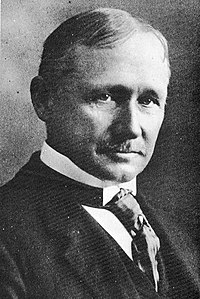 Last time, the ghost of F.W. Taylor told us about management-labor cooperation and gave us a hint of his Utopian vision. Today, he's still going on about cooperation and how it is to be achieved. Let's listen in....
Last time, the ghost of F.W. Taylor told us about management-labor cooperation and gave us a hint of his Utopian vision. Today, he's still going on about cooperation and how it is to be achieved. Let's listen in....Since scientific management requires companies to define each task to the finest detail, there must be a massive expansion of management activity going on as well. And indeed, that is the case. According to Taylor, scientific management requires the establishment of a large and elaborate management structure to plan the work of each worker at least a day in advance, record each worker’s output, train each worker as needed for each task, keep and issue necessary tools each day, etc (cf. p. 70). Whereas previously, workers had provided their own tools, expertise, and initiative, now all three of those categories would fall strictly under the control of the new, massively expanded management.
Achieving maximum output requires cooperation, but no individual worker has the authority to require peers to cooperate in that effort. Only management has that power. Therefore,
“It is only through enforced standardization of methods, enforced adoption of the best implements and working conditions, and enforced cooperation that this faster work can be assured. And the duty of enforcing the adoption of standards and of enforcing this cooperation rests with the management alone.” (cf. p. 83. Original emphasis)
Management must train all workers and dismiss those who are unable to meet the required work pace after training. Management must also recognize that workers will not submit to rigid task standardization and faster pace of work unless they receive a substantial increase in pay in return. And finally, all four components of scientific management must be applied in order to realize the promised results (see the previous post in this series).
This is beginning to sound less and less Utopian, despite Taylor's repeated and plaintive calls for dramatic wage increases after the adoption of scientific management.
Next time we'll drive a stake through the heart of Taylor's Utopian daydream and examine the consequences of his ideas.
All for now....
...-.-
References
Taylor, Frederick Winslow, The Principles of Scientific Management. New York & London: Harper, 1911, reprint edition, 1934.






No comments:
Post a Comment